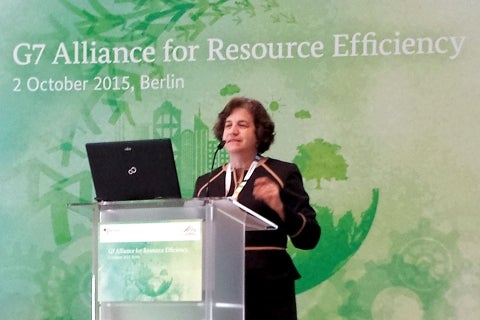Note: Yale School of the Environment (YSE) was formerly known as the Yale School of Forestry & Environmental Studies (F&ES). News articles and events posted prior to July 1, 2020 refer to the School's name at that time.
F&ES Prof. Marian Chertow this week is participating in a workshop of the G7 Alliance on Resource Efficiency, an invitation-only gathering of international leaders held Washington, D.C. that explores life cycle-related concepts in sustainable supply chain management.
 Marian Chertow
Marian Chertow
Created last year by G7 leaders, the Alliance on Resource Efficiency provides a forum to share knowledge, create information networks, and encourage collaboration with large and small businesses and relevant stakeholders to advance resource efficiency and promote innovation.
Chertow, an Associate Professor of Industrial Environmental Management and Director of the Program on Solid Waste Policy at F&ES, has devoted much of her research at the Yale Center for Industrial Ecology to the reuse of resources across networked firms.
The G7, or Group of Seven, a group of the world’s biggest economies, meet annually to discuss globally important issues. In addition to the U.S., the G7 consists of Canada, France, Germany, Italy, Japan, and the United Kingdom.
This week’s event marks Chertow’s third appearance at a G7 Alliance on Resource Efficiency workshop. She was chosen by the Environmental Protection Agency to represent the U.S. at the Alliance’s launch last fall in Berlin. During that meeting, one scientist from each country spoke on the topic of promoting resource efficiency. She also spoke at its workshop on industrial symbiosis held in Birmingham, UK last October. (Industrial symbiosis engages two or more industries or businesses in the exchange of wastes, materials, energy, and water in a way that adds value, reduces costs, and improves environmental outcomes.)
Chertow, an Associate Professor of Industrial Environmental Management and Director of the Program on Solid Waste Policy at F&ES, has devoted much of her research at the Yale Center for Industrial Ecology to the reuse of resources across networked firms.
The G7, or Group of Seven, a group of the world’s biggest economies, meet annually to discuss globally important issues. In addition to the U.S., the G7 consists of Canada, France, Germany, Italy, Japan, and the United Kingdom.
This week’s event marks Chertow’s third appearance at a G7 Alliance on Resource Efficiency workshop. She was chosen by the Environmental Protection Agency to represent the U.S. at the Alliance’s launch last fall in Berlin. During that meeting, one scientist from each country spoke on the topic of promoting resource efficiency. She also spoke at its workshop on industrial symbiosis held in Birmingham, UK last October. (Industrial symbiosis engages two or more industries or businesses in the exchange of wastes, materials, energy, and water in a way that adds value, reduces costs, and improves environmental outcomes.)
Life cycle is a key industrial ecology concept that is really coming to prominence in the discussions as an important approach to resource efficiency.
The latest workshop, which will examine “the use of life cycle concepts in supply chain management” to achieve resource efficiency, is being hosted by the U.S.
“I am delighted that 200 people are attending the workshop from numerous countries and industries to make progress on supply chain issues,” said Chertow. “Life cycle is a key industrial ecology concept that is really coming to prominence in the discussions as an important approach to resource efficiency.”
The U.S.-hosted workshop provides a forum for industry representatives, senior policy-makers, researchers and interest groups to advance resource efficiency goals to:
“I am delighted that 200 people are attending the workshop from numerous countries and industries to make progress on supply chain issues,” said Chertow. “Life cycle is a key industrial ecology concept that is really coming to prominence in the discussions as an important approach to resource efficiency.”
The U.S.-hosted workshop provides a forum for industry representatives, senior policy-makers, researchers and interest groups to advance resource efficiency goals to:
- Identify and document best practices related to the use of life cycle concepts in sustainable supply chain management that are scalable, replicable, and transferable across organizational and geographic boundaries.
- Share information about tools, resources, and programs that can help manufacturers, suppliers, and other stakeholders improve their use of life cycle concepts to achieve greater resource efficiency.
- Explore key challenges to implementing life cycle concepts and engage in conversations that will advance resource efficiency practices across the supply chain.
- Through facilitated discussions, generate promising ideas for voluntary individual and collective action to achieve resource efficiency goals.
Published
March 23, 2016